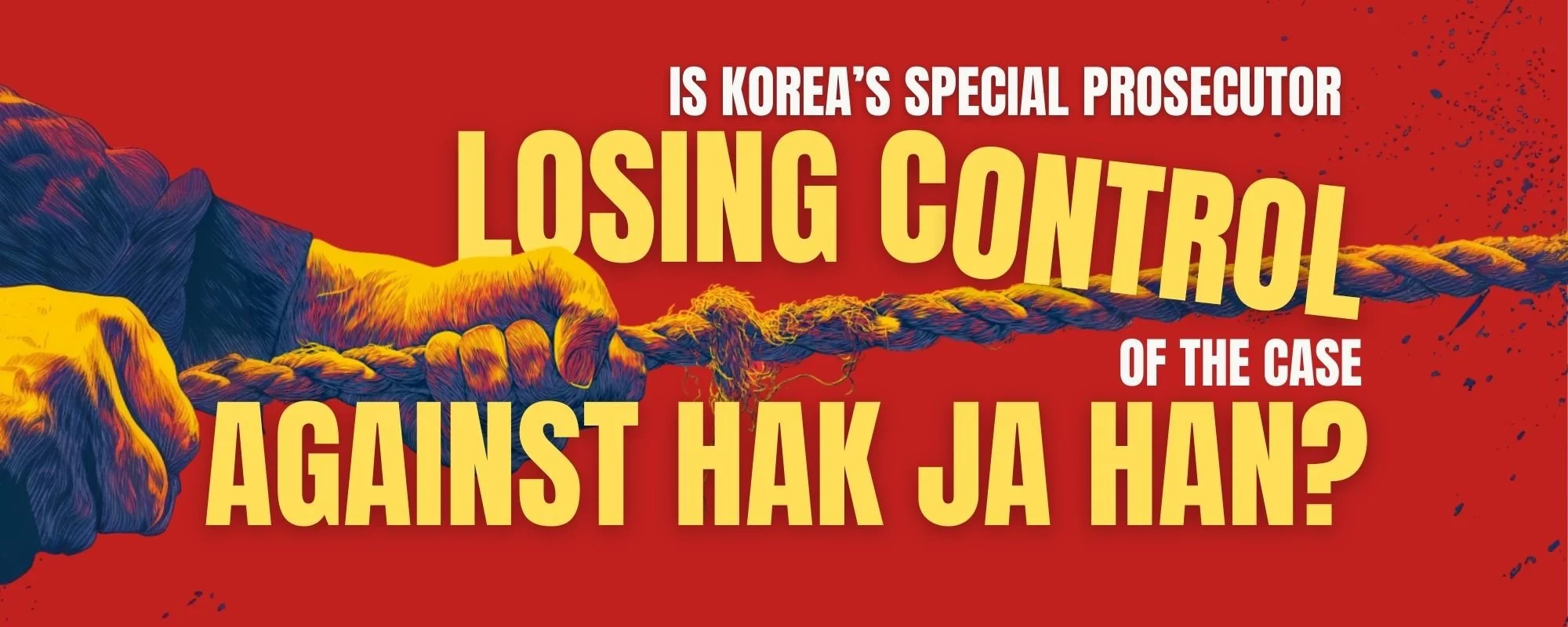Is South Korea’s Special Prosecutor Losing Control of the Case Against Hak Ja Han?
The latest reporting from Yonhap News, combined with firsthand observations from inside the courtroom, indicates that the Special Prosecutor’s case against Dr. Hak Ja Han, the Mother of Peace, is entering increasingly uncertain territory. What was expected to be a clear demonstration of state authority is instead revealing serious questions about evidence, legality, and proportionality, particularly in its application to a religious leader.
The formal trial begins on December 1, the same day the court will consider Dr. Han’s bail request. Yet the pre-trial hearing on November 21 exposed structural weaknesses in the prosecution’s approach that raise broader concerns about state overreach into religious affairs.
Based on the verified Yonhap report and confirmation from a trusted eyewitness who was present in the courtroom, I can highlight five critical developments.
1. The prosecution’s main witness plans to refuse testimony
Former World Headquarters Director General Yoon Young-ho will not testify. This is a serious setback for the prosecution. After multiple raids on church facilities, the seizure of over twenty thousand pages of documents, and the collection of multiple devices, prosecutors have yet to produce direct evidence tying Dr. Han to any instruction or authorization of political donations.
Their case relies heavily on Yoon’s notes. With Yoon refusing to speak, the strength of their allegations begin to fray.
“When your star witness refuses to testify, you do not have a case. You have a headline.”
2. The judge questioned whether the charges are legally valid
The presiding judge instructed the Special Prosecutor to submit a written explanation on the most fundamental issue of the case: whether Korean law even allows for criminal punishment of a religious organization that provides political funds.
This request appears both in the Yonhap article and in the eyewitness notes. It is not a routine legal question. It signals that the court is not convinced that the indictment rests on a clear statutory basis.
When the court itself raises constitutional and statutory concerns, the legitimacy of the state’s approach becomes part of the story.
“It is never a good sign when the court asks whether your case is legal.”
This is a critical moment that touches on concerns shared by many religious communities about expanding state power and ambiguous legal boundaries.
3. The prosecution’s push for a speedy trial raises flags
The Special Prosecutor demanded two hearings per week. The defense responded that this is unmanageable for a detained 82-year-old defendant with recent surgery and ongoing medical needs. The court settled on approximately 1.5 hearings per week.
Speed in itself is not wrongdoing, but when paired with disputes over evidence and a lack of direct proof, accelerated scheduling begins to look tactical rather than necessary. It also interacts directly with Dr. Han’s age and physical condition, which raises human rights concerns.
“Prosecutors who have evidence want time. Prosecutors who do not have evidence want speed.”
This type of pressure is often interpreted by observers as an example of state institutions using procedural weight to assert control rather than pursue balanced justice.
4. The luxury-gift allegations remain unproven
Yonhap repeats the allegation that a necklace and a Chanel bag were routed through a third party. There is still no physical evidence. No chain of custody. No confirmation of receipt. No recovered items.
A co-defendant admitted delivering a necklace to Yoon, not to any government figure, and denied any illegal intent. The accusation stands uncorroborated.
“When the evidence is missing, so is the crime.”
5. Dr. Han appeared in custody and the courtroom atmosphere was tense
According to the eyewitness report, Dr. Han appeared in person while still detained. The courtroom was full and the exchanges between the two sides were tense and closely controlled.
0:01 / 1:01
Given her age, recent eye surgery, recurring cardiac issues, and vision impairment, her continued detention raises questions that go beyond legal theory. It touches on how far state power should extend when dealing with vulnerable religious figures.
The larger picture
A clear pattern is emerging:
• The main witness will refuse to testify. • The judge is questioning whether the charges are even grounded in law. • The prosecution is rushing the schedule beyond normal expectations. • Key allegations lack substantiating evidence. • A frail religious leader remains in detention under pressure. • The defense is contesting the entire evidentiary foundation.
These are not signs of a stable legal case. They are indicators of a state apparatus pressing hard into a religious community without showing the level of evidence that such intrusion would normally require.
“Uhhh...This trial is not showing state power. It is showing state panic.”
The trial beginning December 1 will not only test evidence. It will test the boundaries between state authority and religious freedom in a moment when those boundaries appear increasingly strained.
Sources:
• Yonhap News (연합뉴스), Reporter Lee Mi-ryeong, Nov 21, 2025 Original Korean:
https://n.news.naver.com/article/001/0015755897
• Verified observations from an eyewitness who attended the Nov 21 hearing and reports directly to me.

